First, my overall impressions. In particular it's interesting to constrast this conference with the
Peak Oil and Community Solutions conference in Yellow Springs a couple of months ago. If that conference could have been subtitled "Peak Oil for Grey Ponytails", this one is "Revenge of the Suits". More than half of the attendees are attired in that fine expression of sartorial status in Western culture, with most of the rest in either "academic sports-jacket", or business "I escaped the office to this conference" smart casual (the latter category including yours truly).
The attendees are in fact an extremely interesting cross section. There are a very roughly equal mix of:
- Hydrocarbon production industry folks,
- Alternative energy folks
- Financial/investment/analyst community
- Academics/researchers
- Policy/legislative people
- Non-profit/environmental/peak-oil activists
- Media folks
That mix makes for interesting Q&A sessions, and interesting break discussions.
After introductory remarks from ASPO-USA organizers Steve Andrews and Randy Udall, and cohost Kathleen Beatty of CU Denver, we move to the first speaker, Tom Petrie.
Tom Petrie
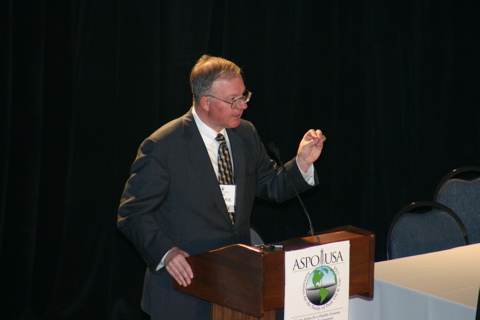
Tom Petrie talking about Peak Oil.
Tom Petrie is CEO and Co-founder of Petrie, Parkman and Co, a boutique investment bank in the oil industry. His company is basically a competitor to Simmons Co, and has offices in Denver and Houston. As such his presentation was extremely interesting, not because he said anything profoundly surprising to someone who has been following Peak Oil, but because he shed a great deal of light on the question: is Matt Simmons isolated in his views within the energy investment banking community? Answer: no. Petrie is a little more moderate in his views than Simmons, but basically the big picture is the same: he believes Peak Oil is not too far off, he thinks OPEC reserves are exaggerated, and he thinks alternative hydrocarbons, EOR, etc will soften the decline, but nonetheless considerable demand side adaptation to declining liquid fuel supply is going to be required. He differs from Simmons -- "I don't completely agree with Matt" -- especially in thinking that "the Saudis probably have a little more fat", and perhaps in thinking peak is somewhat further out, but believes Simmons has done a great job of elevating the profile of the debate. Tom worked through several scenarios around being more or less optimistic about the amount and timing of new projects and more or less optimistic about depletion of the fields currently in production. Only if depletion of FIP is very mild and delays can be ignored do we avoid peak oil before 2010. More likely, we are peaking sooner.
Chris Skrebrowski
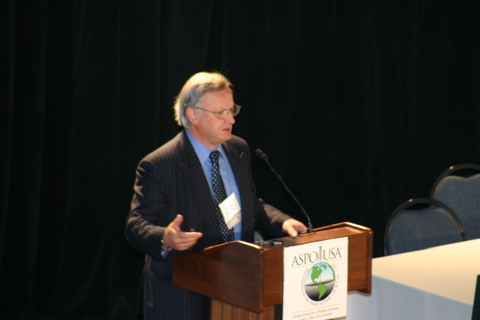
Chris Skrebowski contrasting his views with those of CERA
Next up was Chris Skrebowski, well known to the Peak Oil community for his recent
MegaProject Reports. Chris is a long time oil industry person and has edited Petroleum Review for the last eight years. He basically gave a summary of his current views on the near term situation. In essence, he agrees with CERA that there are about 16-17mbpd of new capacity coming on between now and 2010, and the key differences are around depletion. He assumes 5% depletion of the fields in production, which gets us in trouble pretty quickly.
Following Chris's talk, he and Tom sat for a Q&A session. I think the dominant message sent during the first sessions was "Credible people believe this stuff". There was a limited amount of really new material for peak oil followers, but probably these talks were more aimed at the folks at the conference that hadn't already drunk the cool-aid.
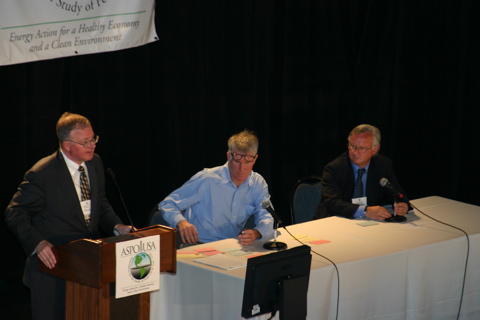
Tom Petrie and Chris Skrebowski take questions with moderator Randy Udall.
Jeremy Gilbert
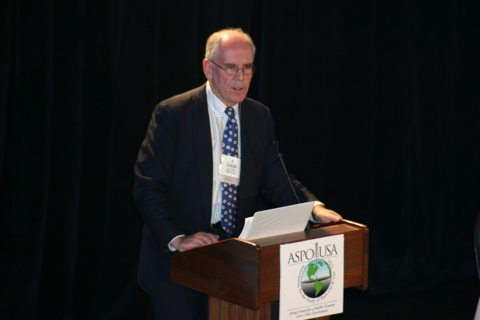
Jeremy Gilbert preaching the gospel according to ASPO-Ireland
Jeremy Gilbert is the recently retired chief Petroleum Engineer of BP, and a delightfully accented Irishman with a lifetime of experience in the oil industry. If Tom Petrie proved "Matt Simmons is not alone", then Jeremy Gilbert proved "Colin Campbell is not alone either" as a long standing senior technical figure in the oil industry who believes in Peak Oil. Indeed Jeremy is also involved in ASPO Ireland and his talk was cowritten with Colin. Jeremy gave a very nice overview of how oil gets formed, the typical way the fields in a basin get discovered, and then summarized discovery and production curves for a number of key basins. He culminated with the new ASPO projection (the one with the extra deepwater that gives peak oil in 2010).
The talk didn't give too much new for peak oil followers, but was a very nice introduction, and it all adds to the increasing wave of credibility.
Henry Groppe
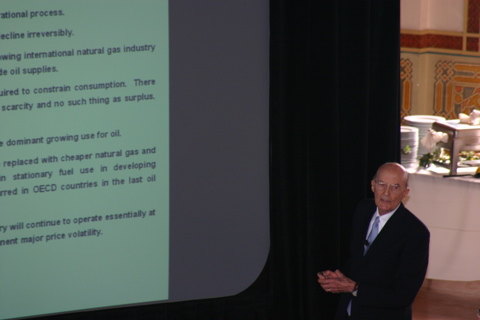
Henry Groppe lectures on how it's going to be.
One of the speakers that I personally got the most out of was Henry Groppe, founder of Groppe, Long, and Littel, an energy analysis firm. While he is now a gentleman of increasing years, he struck me as extremely savvy and thoughtful and likely to be calling the future better than anyone else I've heard.
On the supply side, he believes oil is pretty much at peak and will flatten out and then start declining. But what caught my attention was his opinion on the demand side. He believes that something like 20mbpd of the current 84mbpd of oil demand is going for heat and power generation primarily in developing countries. He thinks that with oil in the $50-$60 range, all of this will get converted to coal or natural gas, and that, along with vehicle fuel efficiency, will be the main initial responses to peaking, and will keep us out of serious economic pain for a decade or so.
I need to research it, but that story made a lot of sense to me. Fuel switching in heat and power was exactly what the US and Europe did back in the late 70s and early eighties, so it's believable that developing countries would do that this time around. Combine that with a lot of OECD fuel efficiency improvements (which have already begun) and we can probably maintain economic growth through quite a bit of the early post-peak era (except for geo-political shocks). That also buys us more time to start doing the harder things that will need to be done down the road.
Charlie Brister
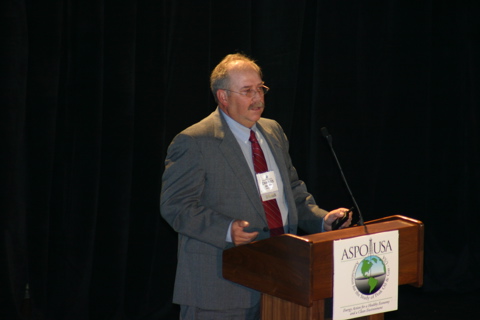
Charlie Brister, who knows how to steer a drill bit into a 3' target several miles under the ground.
Charlie is a directional driller. He works as part of a rig crew in Montana, and sits and watches a piece of the drill train the measures the gamma radiation coming from the rock (with a Geiger counter), and compares it with the known signature of the rock layers (from other wells in the past). By this, and other means, he and his crew are able to know exactly where they are in the rock layers - it's called geo-steering. Their current project involves drilling horizontally several miles through a payzone that is 3 feet thick under 10000 feet of rock.
It's absolutely staggering, both that it can be done, and that it needs to be done.
Charlie gave a really great talk with a lot of photos of life on his rig, what happened to the industry over the last thirty years with all the contraction and pain, and how old the workforce is now, and how bloody hard they all still work.
John Barnes
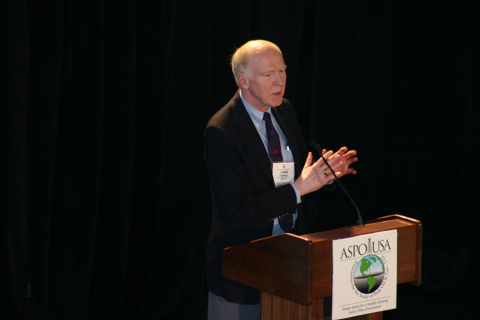
John Barnes.
John Barnes gave us a flavor of what it's like to run a small independent oil exploration firm. The independent sector in the US produces most of the oil and gas, since the US is such a mature production area. Production is coming mainly either from small fields, or extracting the production tail from large fields, and both things are best done by small companies with lower cost structures than the majors.
A big them of his talk was the difficulty of the current economics of exploration now that the industry has hit so many capital bottlenecks. His costs are inflating by about 5% a month, between steel for casings, mud, energy to run the rig, and everything else needed. There are long delays for ordering many parts, and any delay costs massive amounts of money.
Lunchtime Awards and Keynote
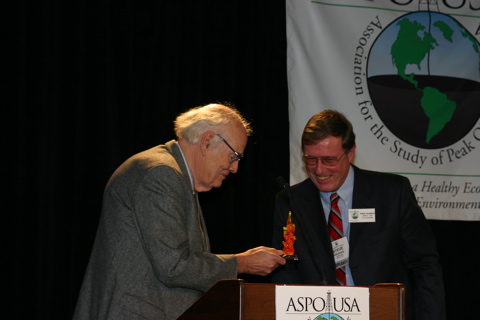
Steve Andrews giving Al Bartlett one of the first M. King Hubbert Awards.
At lunch, Steve Andrews announced winners of the first annual "M. King Hubbert Awards", which ASPO-USA will be giving out for service to the cause of public understanding of peak oil. The first winners were
L.F. (Buz) Ivanhoe, the founder of the M.King Hubbert Center for Petroleum Supply Studies,
Al Bartlett, a Professor Emeritus of Physics at the University of Colarado, who is famous for his writing and lecturing on the dangers of exponential population and economic growth in a finite world, and retired Oregon Geology Professor
Walter Youngquist, author of
GeoDestinies. Finally, our keynote speaker got one:
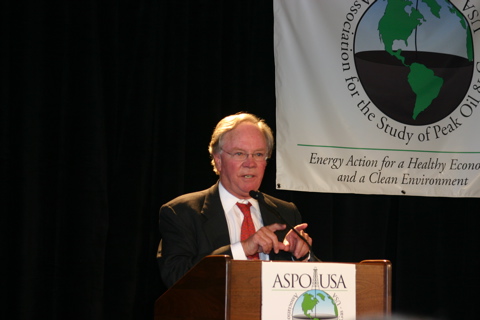
Matt Simmons giving the keynote address.
Matt gave a very good talk - his main themes will be familiar to TOD readers. Particularly interesting points where his view that the natural gas situation in the US is significantly more serious than the oil situation, and a tidbit of news he credited to Bloomberg that Kuwait's giant Burgan field has gone into decline (though I can't substantiate this on the web). I also managed to score a one-on-one interview with Matt - that write-up will come later.
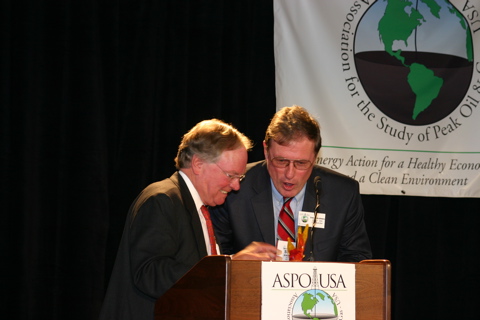
Steve Andrews giving Matt Simmons another of the M. King Hubbert Awards.
Charles Hall
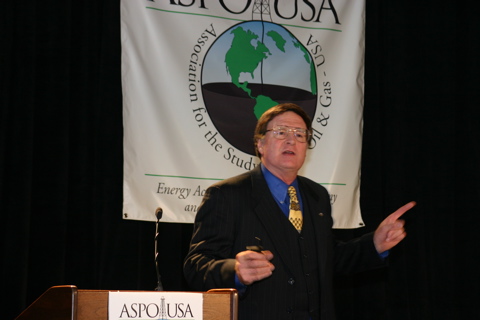
Charles Hall.
Next up was Charles Hall, a famous guru of EROEI analysis, who gave a dynamic overview of the history of that style of analysis, and what is known of the current EROEI for various fuel sources (although these numbers seem to be very controversial and not well agreed on). An interesting sidepoint was that hardly any of the greats of academic energy analysis (Hall, Cleveland, Ayres, etc) have received any funding for their work on it - it's essentially been done on their spare time.
Randy Udall
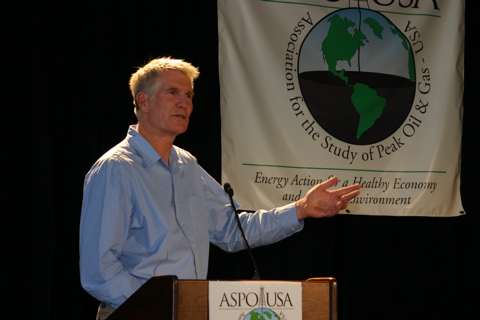
Randy Udall.
Randy Udall gave a short introductory piece introducing the next few speakers and placing them in the context of the resource pyramid - the idea that there's a pyramid with an apex of relatively small quantities of high-quality energy sources, and a base with very large amounts of lower quality fuels, to which we then turned. Randy is somewhat optimistic that with hard work and Yankee ingenuity, we can produce enough of these things to get by.
Mike Ashar
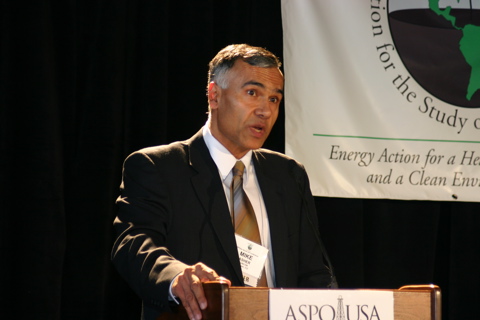
Mike Ashar.
Mike Ashar is Executive Vice President with Suncor, a pioneering producer of syncrude from Canada's tar sands. He gave an overview of Suncor's history and production plans, and also talked about current industry plans, which give growth to 2mbpd by 2010, and 5mbpd by 2030. However, he said the current plans were predicated on $40 oil, and things might get developed faster if oil stayed in the $50-$60 range. He alluded to the problems of carbon emissions, natural gas cost risk, land and water degradation, but I didn't feel like I really got the straight scoop on whether these issues are likely to really impact the growth of the industry or not (obviously he's a producer, so he's not going to tell any barrier is insurmountable).
Michael Pacheco
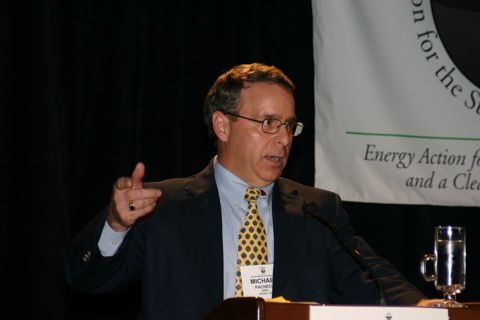
Michael Pacheco, covering the continent in biomass crops.
Michael Pacheco is the director of the National Bioenergy Center, part of the National Renewable Energy Laboratory. He gave a talk arguing that biofuels could eventually replace a sizeable fraction - 50-60% - of US gasoline usage. He argues that Pimentel and Patzcek are wrong because they use outdated numbers and really ethanol from corn has a positive net energy. But more importantly, they hope to make breakthroughs that allow them to ferment the woody (cellulose and lignin) parts of plants to fuel, thus allowing them to use a variety of fast growing trees and grasses as biofuel, including ones that could grow in arid areas. They can also use a significant fraction of agricultural waste from food production.
I didn't quite find this plausible, but nor do I know enough to say it's wrong. As Jim Ulrich of Petrie Parkman put it to me at the reception last night: "I just have a problem with the concept of burning food". Clearly this whole question of biofuels needs much more intensive examination on the Oil Drum in the future.
Jeff Probst
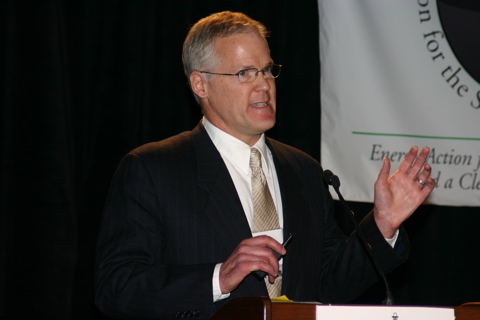
Jeff Probst.
Jeff Probst is the President and Chaiman of Blue Sun Biodiesel. They are in production today making a commercial B20 blend of 20% biodiesel and 80% regular diesel. They are vertically integrated, growing oilseed crops (mainly in Colorado), and refining, blending, and marketing their own product. He gave an overview of their operations, and argued that this kind of operation could be scaled up to a large amount of biodiesel (given a lot of capital).
Film Festival
After a floor comment session and a reception, we had a choice of going to a session on net-energy or a peak-oil film festival. I admit to following the easy path here and going to the film festival.

Gregory Green.
Gregory Green, producer/director of "End of Suburbia", gave excerpts of his sequel documentary on "Escape from Suburbia", which looks pretty intriguing.
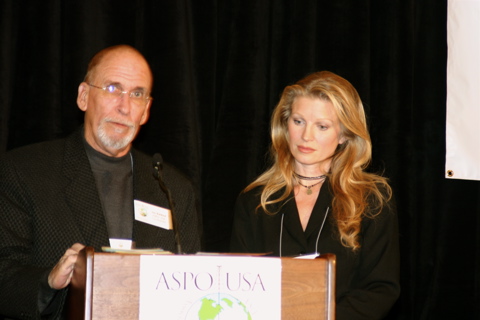
Melody Chase being introduced by ASPO-USA interim President Jim Baldauf.
Finally, proving that not all peak-oilers are old, male, and ugly, Melody Chase, star in the Fox TV production
Oil Storm showed some clips of the movie. She also talked a little about how she had been completely unaware of the issues prior to being involved in the film, but had become very conscious of them as a result.






















When fellows in suits stand up to essentially market their products, I think we are moving past the realm of speculation on future energy sources. We usually talk about Wind, Solar, Geothermal, and grudgingly accept the inevitability of more Nuclear, but here we see Synfuels and Biofuels are trying to stake out the market. They say, "If they have to market a drug on TV, you don't want to use it." I wonder if the same goes for energy.
In the blurb for his latest pdf book, Matt Savinar also talks about most all peak-oilers being white male 50-somethings, which I find to be an interesting demographic. Why us? Are we facing our mortality through PO?
I look forward to reading your Simmons interview, especially if he reacts to the decision on ANWR drilling.
World Coal Estimates in Millions of short Tons
Anthracite Lignite
Country 2004 2005 2004 2005
Brazil 13,149 11,148
Germany 25,353 202 47,399 7,227
UK 1,102 243 551 0
Hungary 1,209 3,482
Poland 22,377 15,432 2,050 0
Iran 1,885 462
Botswana 4,740 44
Japan 852 396
China 68,564 68,564 57,651 57,651
(Sorry couldn't get the columns lined up properly)
China has exactly the same totals despite using approximately 2,000 miilions tons last year.
UK which should be good at reporting, "lost" or "burnt" an astonishing amount of coal during 2005. Is it under Scargill's bed? Lots of countries in South America, Middle East, Asia and Africa have no coal. From the EIA figures it seems unlikely that Henry Groppe's idea of using coal substitution in the third world will happen. Does anyone have a better source or a more believeable set of figures? Many countries (like USA and China) showed no change in reserves from 2004 to 2005. Are they copying OPEC's idea on reserve numbers? Perhaps the coal situation is worse than it appears?
The link to EIA coal reserves is:-
http://www.eia.doe.gov/emeu/international/coal.html#Reserves
2005-11-10 03:29 (New York)
By James Cordahi and Andy Critchlow
Nov. 9 (Bloomberg) -- Kuwaiti oil production from the world's
second-largest field is ``exhausted'' and falling after almost six
decades of pumping, forcing the government to increase spending on
new deposits, the chairman of the state oil company said.
The plateau in output from the Burgan field will be about 1.7
million barrels a day, rather than as much as the 2 million a day
that engineers had forecast could be maintained for the rest of
the field's 30 to 40 years of life, said Farouk al-Zanki, chairman
of state-owned Kuwait Oil Co. Kuwait plans to spend about $3
billion annually for the next three years to expand output and
exports, three times the recent average.
To boost oil supplies, ``Burgan by itself won't be enough
because we've exhausted that, with its production capability now
much lower than what it used to be,'' al-Zanki said during an
interview in his office in Ahmadi, 20 kilometers south of Kuwait
City. ``We tried 2 million barrels a day, we tried 1.9 million,
but 1.7 million is the optimum rate for the facilities and for
economics.''
Persian Gulf oil producers, which supply about a fifth of
world demand, are rushing to find new reserves and build more
pipelines and export terminals to compensate for declining output
from older reservoirs. Any delay in replacing supplies may push
oil prices higher and slow economic growth, the International
Energy Agency said in a report this week.
To be sure, the plateau in supply if achieved would be higher
than a projection from the IEA. This week the Paris-based group
said output from the Greater Burgan area will increase from 1.35
million barrels a day in 2004 to 1.64 million a day in 2020,
before falling to 1.53 million a day in 2030. The field now pumps
between 1.3 million and 1.7 million barrels a day, al-Zanki said.
Sustainable Supply?
The debate over the sustainability of Middle East oil
supplies has gained pace this year, after investment banker
Matthew Simmons published ``Twilight in the Desert: The Coming
Saudi Oil Shock and the World Economy.'' In the book, he asserted
the practice of injecting water into Saudi fields may lead to
rapid production declines. Saudi officials rejected the charge.
Brought into production in 1948, Burgan accounts for more
than half of Kuwait's 96.5 billion barrels of oil reserves, or 55
billion barrels. Only Saudi Arabia's Ghawar oilfield, about 500
kilometers (313 miles) to the south, is bigger.
Benchmark New York oil futures have tripled in price during
the last four years to a record $70.85 on Aug. 30 because
countries such as Kuwait and Saudi Arabia haven't invested enough
in expanding production capacity to keep pace with faster-than-
expected demand from countries such as China, India and the U.S.
Kuwait last month pumped 2.5 million barrels a day,
equivalent to 3 percent of global demand, according to Bloomberg
data. That's down from a peak of almost 3 million barrels a day in
1972, according the Arab Oil & Gas directory.
``Kuwait's oil industry requires significant investment and
needs international oil companies to help kick-start production
capacity increases,'' Colin Lothian, senior Middle East energy
analyst at Wood MacKenzie Ltd., an Edinburgh-based oil industry
consultant, said in a telephone interview.
Burgan on its own had enough reserves to support 2 million or
3 million barrels of daily output, but those have already been
produced, al-Zanki said in the interview two days ago. The
reserves are declining and need to supplemented with other
reservoirs, he said.
Revival Targeted
The family-ruled emirate plans to increase production
capacity by about 18 percent to 3 million barrels a day by the end
of the decade from about 2.55 million now, and to at least 4
million by 2020.
Oil consumers will be more reliant on Middle Eastern supplies
in coming years and vulnerable to higher prices and slower
economic growth should investments be delayed, the IEA, an adviser
to 26 consuming nations, said in an annual outlook released on
Nov. 7.
Petrofac Ltd. and rivals SK Engineering & Construction Co.
won two contracts worth in more than $1.6 billion this year to
upgrade and refurbish 20 plants that separate natural gas from oil
ready for export in northwestern Kuwait. That works is in
preparation to allow international oil companies to develop four
oil fields near the border with Iraq.
``You need to develop more reserves in order to support the
future target,'' said al-Zanki, who was appointed Kuwait Oil's
chairman last year. Kuwait Oil is the country's state-owned
monopoly oil and gas producer.
In a 10-year-old plan known as Project Kuwait, the emirate
may invite companies such as Exxon Mobil Corp., Royal Dutch Shell
Plc and BP Plc to invest about $8.5 billion to almost double
output at the emirate's northern fields to 900,000 barrels a day
by 2025. The project would be the first time since the 1970s that
foreign companies operate Kuwaiti oilfields.
"Kuwait has eight producing oilfields. Its giant Burgan field, discovered in 1938 still accounts for the majority of Kuwait's total production which averaged almost two million barrels per day in 2000. The Greater Burgan area has three distinct structures including Burgan, Magwa and Ahmadi. This was where most of the Kuwaiti wellheads were blown off when the Iraqi's departed Kuwait in 1991. According to reports at the time, the individual wells were producing just over 4,000 barrels per well until the high-pressure wellheads were blown off. Without wellheads, these wells were letting over 20,000 barrels per day escape into the atmosphere until the fires could be put out and the wells re-capped. How many years of flush, choked back production this cost Kuwait will never be known but it is one reason why many now think Burgan has peaked and is in decline."
Great reporting.
yet...
The main issue if I may indulge myself.
The Governmemt... is not moving fast enough
nor in the direction of solution.
A Military Industrial Complex aka
The United States Federal Government
is a rolling roadblock.
The problem and not the solution.
Peak Oil is Big
Government is COLLOSAL.
Beating the drum of Peak Oil
does little to change the tune of
misallocated resources.
Lets - Keep It Simple Stupid - KISS
Avoid Hot air and fingers poking circles in the air.
Push for change - Pull for reform
and all the while...
"Time"... the hell in which we all burn.
Think small, think fast, peace
And have you happened to notice that one of the industry's problems is that so much of its workforce is older and retired or near retirement? Expertise is being lost every day.
And we still in the nuclear business are rather worried about how to handle the flood of orders while teaching our new hires how its done.
As far as the experts still working, as one poster noted, they are too busy working to get involved in this movement. And, if their CEO's, such as Lee Raymond of Exxon are telling them not to worry about it, they won't. It's a corporate culture that's hard to break.
I think one common pattern I see is that people who were grown up already during the 70s are way more likely to be sensitized to this issue.
Here's the same; all folks of 50 yrs or older, close to retirement and no visible workforce with knowledge in sight.
And in the mean time......
Globaly, the trees are dying, the animals are getting whiped out with unprecedented speeds, the water tables are shrinking and the depletion of natural resources sets in. At the same time the human population is growing with exponential rates.
Our society is like an airplane in complete free-fall. Because of the flying sensation, most people think we're flying. But some of us know we're just dropping and see the ground comming on to us, fast. They're trying to get the message out there, hopefully some more will see the ground comming.
And I'm still curious if you have any progress in
educating our politicans. Who only seen to ben interested in
the daily news....
I've checked http://www.peakoil.nl/ but couldn't find something about a report.
The manpower situation is real.
Don't forget that a massive number of new drilling sites will be needed in order to keep up with depletion the comming years.
One sign of problems in workforce-numbers and knowledge is that the oil & gas business start to have accidents at facilities....
While most of the presentations focused on when Peak Oil will occur and how we can try to close the gap between production and demand, U.S. Congressman, Roscoe Bartlett stated that we shouldn't even try to close the gap. It is his belief that this will just create a steeper decline in the end and prolong the solution making efforts.
Also, there were a couple of slides describing the componenets of demand. Transportation, residential/commercial and industrial(of which transporation is the largest). Of course, I expect that everyone believes that our current war is only temporary, but I don't. And, I'm wondering what percentage of our consumption is related to military use. I would like to see that data in future presentations.
Lastly, the Hirsch Report presented by Roger Bezdek , presented three scenarios. The effects of implementing "mitigation crash programs" at the time that Peak Oil occurs, 10 years before occurrence and 20 years before occurrence. Obviously the sooner the better but I fear that just as in Global Warming, denial will be the order of the day until it is too late. Particularly now that the majors have seen the astounding profits that they can get away with by doing nothing.
I have to shake my head in amazement every time I think about what the billions we spent in Iraq could have done if spent on alternate energy R&D and infrastructure. What if we had spent it only on rail transportation - can you imagine? Such an awful waste.
We really should subtract production and transportation costs from the market price. Perhaps $10/barrel? So the claim would be true for $40 oil.
Now that oil's pumped up to $57/barrel, we could say US oil could barely pay our debt to Japan and China. (China holds $248 billion; all foreign holders total $2.063 trillion.)
Any comments on my figures?
OT: I once read that if you translate the price of most anything you contemplate buying into the equivalent in pizza and beer, you'd never buy anything. So how does $685 billion convert!?
Well, it's 2:00am and it looks like the wood stove has caught again, so I'm going back to bed. Nice to have TOD to look at while I'm waiting!
I just got home from ASPO-USA and had no chance to post while I was there. Certain things stood out for me and I'll just a list a few of them for now.
- Peak Oil is a liquid fuels problem and transportation demand is the key. The North American natural gas problem looks pretty hopeless.
- Yes, what HO says about an aging work force in the Oil & Gas industry is a very serious problem. We are losing much needed expertise there with each passing year.
- My impression is that, yes, many retired people feel free to talk about the peak and that people still working in the industry are reluctant to speak out for fear of risking their positions
- Everything depends on depletion rates and nobody has good data to say what they are. There are the many indicators that these may be higher than some often quoted numbers (4% to 6%). Ironically, because it happened during the conference, one of indicators is the news that the Kuwaiti Burgan field has tanked during the conference.
- Roscoe Bartlett is dynamite and pretty sharp and spry for somebody in his 80's. He think's it's pointless to fill in the Hirsch gap. The higher we go on that roller coaster ride up to the top, the harder we fall. He does not believe we should touch ANWR, it should be saved for future generations. I agree.
- Simmon's talk was also great. Somebody said that after all this time and experience, he's got it down to a science as the expression goes. He sure does. He said some very interesting stuff about "conceptual reserves" -- you know, the kind that look good on paper but may not exist in the ground. Or if they do exist, don't really matter anyway. I'll want to write more about that. Speaking of fake reserves, one speaker said that Simmon's had "questioned Ali Al-Naimi's manhood" or something to that effect, so he's pretty much "persona non-grata" with the Saudis.
- Charles Maxwell of Weedon & Co. gave a terrific talk which focused partly on "above the ground" factors. He worried primarily about Hugo Chavez being assassinated as a major disruption. Given that there's only a 5 day shipment time from Venezuela to here and the highly likely outcome would be a civil war there in this event, Maxwell believes oil could easily hit $100/bd within a few days. Venezuela supplies 14% of America's imports. He also made references to the Peloponnesian War in ancient Greece based on the history of Thucydides. As some of you will recall, Athens became embroiled in a disastrous war with Sparta, a number of crises ensued, their democracy fell apart because no one could make a decision and so Athens became ruled by Tyrants so policies could be set as necessary. There is a clear analogy with the coming peak oil crisis and the obvious inadequacy of our political system to deal with it.
I've got other stuff as well. I'm hoping the conference audio will be made available online at their website in the next week or so to supplement my notes. All and all, I felt like I was participating in a world historical event. The conference was totally 1st class all the way, so kudos to Steve Andrews, Randy Udall and all the others who put it together.I did not get a chance to ride in an elevator with Melody Chase as HO did and this was a major disappointment. Spending time with Stuart and HO was a great pleasure. When Stuart got to the microphone to ask a question and introduced himself as being from The Oil Drum, there was applause from the crowd. Almost everyone I spoke to tracks the website, so keep those cards and letters coming folks because people are reading what you're saying.
And here's a question to ponder since I heard about so many alternative vehicles and biofuels it made my head spin --
"What would Jesus drive?"
best, Dave
The conference sounds terrific, and like it provided a very broad outlook. Turning out 400+ people is real progress.
Next steps? At TOD we know what's happening, and every day we get a little closer to the exact timing and extent of the problem. Pretty soon everyone will know that short supply, and strong demand, is a problem that won't go away. Now we need more work on the economic-social-environmental implications of Peak Oil, and what to do to mitigate the impact.
Jesus would have looked skywards and seen that lightening is God's way of sending mixed messages.
He would have understood that electrical drive is the way to go.
He would have driven an all electric camel.
(My Father rode a camel ... my grandson will ride a camel.)
Jesus drives a hard bargain.
No compromises, apologies or regrets.
Pure and simple.
think small, think fast, peace
Stuart - I found this comment particularly compelling and at the root of why I am generally more sanguine than most in this forum. That the substitutes are more readily available than they seem and, if taken to an extreme could imply that the peak oil day zero is driven by choice, not crisis. (Don't bother anwar, we'll shovel coal grab the wind instead.) But peak it does.
But. Some places have coal, many could build nukes, but it is hard to believe the undeveloped world will be able to make the transition as "smoothly" as the US did in the seventies. And, many will be trying to get through the coal and nuke doors at the same time - and there will be more environmental resistance to both this time around.
I can't seem to find any other news source quantifying this info. This would appear to be very bleak news indeed. Guess we must wait another year to see if it will produce 1.6 or 1.7 bbpd. Now if it is below 1.6 bbpd , then we must conclude Matt Simmons "vision" is correct.
But the kicker is that there appears to be no news about this anywhere, meanwhile, gasoline is still dropping daily, 2.16 at a station in Houston. .
Phil Flynn, reports on 321energy.com is showing on "the energy report" the following:
[ Stopped on long December Crude from apprx 5950 at apprx 5750. Buy December Crude at 5550 - stop 5450.
Stopped on long December heating oil from apprx 17600 at apprx 17500. Buy December heating oil at 17150 - stop 16970.
Stopped on long December unleaded from apprx 15600 at apprx 15300. Buy December unleaded at 14500 - stop 14300.
We're long December natural gas from apprx 1130 - stop 1099. ]
I can read this as: expect unleaded to drop a little more, and oil will drop a little more, down to 55'ish.
perhaps this was reported before the news on the Kuwait Burgan field being exhausted, but I can't help but wonder if peak oil has just been accelerated.
comments?
Think of it as having another ten years production, but spread out.
The article also points out that this peak now casts serious credibility on the IEA forecasts because they relied on Burgan and other large fields to continue carrying the load for decades more.